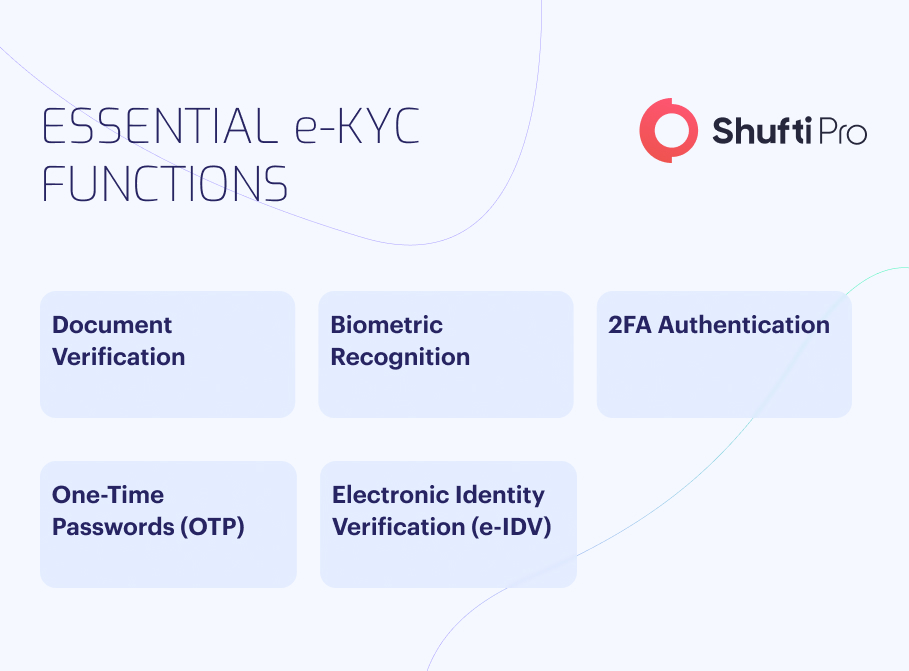A Comprehensive Guide to Choosing a Perfect e-KYC Solution for Businesses

Most of our processes, including financial and business dealings, have now shifted to online platforms. While this mode provides more convenience to users and allows them to make their processes more efficient, it also has drawbacks. It exposes users to many threats, ranging from data breaches to identity theft, which can be used in various ways to manipulate the stolen information, which is then used to commit crimes under a user’s name. As per a report by Statista, e-commerce transactions will grow 11 percent globally by 2027. Moreover, figures from the World Bank indicate that the recent COVID-19 pandemic boosted digital payments significantly, further accelerating the digitization of our day-to-day processes. A significant threat businesses face is cybercriminals using exploited information to conduct crimes.
To successfully prevent engagement with fake entities, businesses need e-KYC to safeguard their processes. e-KYC, or KYC, is the process of identifying customers before engaging in any kind of activity with them. The difference between the traditional KYC method and e-KYC is that users are identified electronically without needing to be physically present.
What is e-KYC: A Brief Overview
According to a report by Facts and Factors, the global e-KYC market size was worth around USD 1571.12 billion in 2021 and is predicted to grow to USD 2792 billion by 2030 at a CAGR of 21.55%. e-KYC is basically a due diligence process carried out to verify entries at the time of onboarding. It can be divided into two major categories: document KYC and video KYC. In standard cases, a user must provide identity documents, which are verified against global databases to ensure that the entity is now listed in any criminal records or has no misconduct records. e-KYC methods provide businesses with a broader range of verification features that make identity verification even more convenient.
Users can simply use their mobile phones to verify their identities. Modern technologies such as Artificial Intelligence (AI) and Machine Learning (ML) have greatly aided e-KYC technology in creating advanced electronic identity verification mechanisms. e-KYC solution providers have now integrated technologies like biometric facial recognition and liveness detection, which allow companies to verify entities with video. This prevents the threat of deepfakes and ultimately safeguards the companies from the risk of potential financial losses.
Document verification is also more convenient with e-KYC as it has OCR technology. It allows businesses to verify the identity documents of users remotely. Document verification provided by e-KYC is useful, especially when onboarding remote individuals from other parts of the world. e-KYC takes care of the whole verification process for the business and makes the onboarding process hassle-free and convenient. By verifying entities within seconds, e-KYC ensures seamless onboarding and saves both parties significant time.

Preventing Financial Crime with e-KYC
e-KYC verification plays a crucial role in identifying and eliminating potential threats before they can cause damage. At the time of onboarding, all the necessary information on an entity is fetched with the help of advanced KYC technologies, which is then verified against global databases and records. Many cybercriminals and illegal entities often mask themselves as legitimate entities and try to establish relationships with businesses, which are then exploited to carry out financial crimes.
There is also a significant threat from money launderers and terrorist financiers who use legitimate businesses as a gateway to hide their illegal assets. A KYC check can help businesses establish the identity of all the entities that are willing to establish a relationship with them. This way, businesses can identify money launderers and cyber criminals who may be pretending to be legitimate entities.
Another significant aspect of financial fraud in KYC is customer and employee fraud. This is quite basic, as these individuals use mechanisms such as phishing attempts and follow general scamming methods. Cybercriminals can be caught before they strike with e-KYC systems that incorporate AI technologies. Ultimately, these small scams can add up to a significant sum of a company’s finances, so they should be prevented.
e-KYC systems also play a crucial role in identifying suspicious transactions and potential high-risk customers. This is primarily done by the continuous monitoring provided by online e-KYC. These software solutions keep a close eye on the entities being onboarded and those already onboarded. These software solutions identify and flag suspicious entities by accurately predicting their actions and analyzing their behaviors. These entities are then subjected to increased monitoring, and if they exceed a specific risk score, they are eliminated on the spot. e-KYC transaction monitoring can track the origin of an asset and ensure that it is coming from a legitimate source and that it is not an illicit asset being masked.
The Significance of e-KYC for Businesses
FinCEN predicts the CDD Rule will cost banks and their customers between $700 million and $1.5 billion over the next decade. Manual KYC checks are resource-intensive, and they do not have perfect accuracy. In contrast, e-KYC solutions have an accuracy of up to 90% because of their AI-integrated technologies. Businesses can also leverage a low-cost verification solution that can help them get better results than traditional KYC processes.
-
Increased Accuracy and Efficiency
e-KYC solutions can help businesses leverage unmatched accuracy and efficiency. Traditional KYC takes hours and days to verify the entities. If further complications occur, it can get further delayed. In contrast, an e-KYC system can accurately verify users in seconds. e-KYC significantly reduces errors because of its AI-backed approach, which processes all data sets accurately. It can help businesses process large amounts of data in less time, saving them significant time and resources.
-
Compliance with KYC Laws
e-KYC generates automated, custom reports on-demand, which helps businesses comply with KYC regulations. Global regulatory bodies require firms to comply with a particular set of KYC rules and regulations. These rules are strict, and companies that do not comply are subjected to hefty fines and charges. e-KYC is the perfect solution for businesses looking for an ideal verification solution, along with an automated compliance mechanism that frees up the burden of reporting about every business deal.
-
Maintaining Market Reputation
Establishing relationships with high-risk entities or involving such activities can significantly damage a business’s reputation. If a company faces a financial loss due to doing business with an illicit entity, it also loses the trust of its stakeholders and investors. e-KYC helps companies avoid getting scammed by cybercriminals and maintain a good image in the market. If all the stakeholders and investors experience a sudden financial loss from a business, it is natural for them to pull all their investments out, leaving the company bankrupt.
Choosing the Right e-KYC Partner
Adopting e-KYC is often considered a hassle, but the case is different. e-KYC solution providers use API integration to integrate the solution into a company’s processes seamlessly. Businesses should first analyze their business models and determine the scale at which they will be deploying the e-KYC process. A proper business model should be established to boost business growth by leveraging e-KYC and complementing the rest of the business processes. Educating workers on e-KYC is also an essential task that should not be ignored because, if done right, it can boost business growth significantly.
Shufti offers eKYC solutions to 240+ countries and territories and supports 150+ languages, helping businesses keep scammers away and comply with regulations.
Here’s what makes Shufti’s eKYC solution stand out:
- No document uploading
- Fast customer onboarding
- 99% accuracy rate and verifies clients within seconds
- Real-time authentication from government databases
Want to know more about how eKYC helps businesses keep scammers away?

 Explore Now
Explore Now













